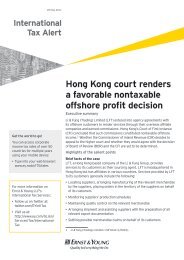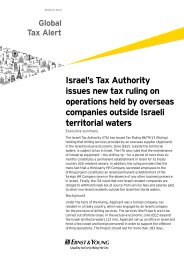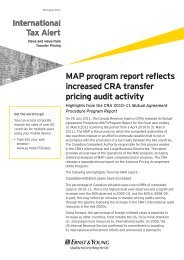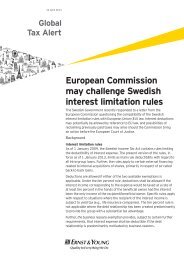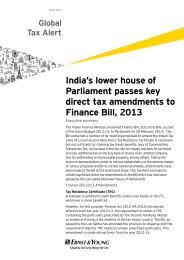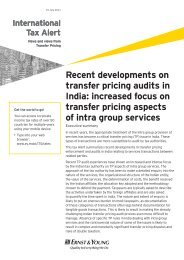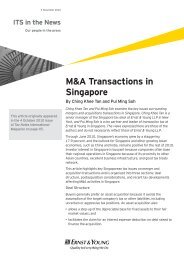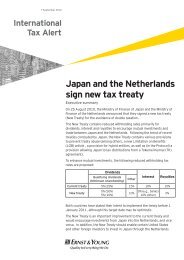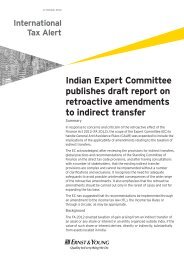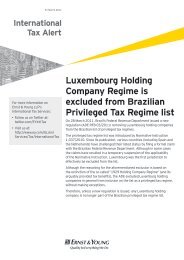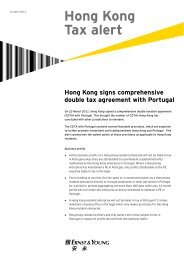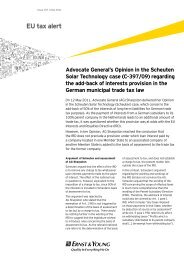Download - Ernst & Young T Magazine
Download - Ernst & Young T Magazine
Download - Ernst & Young T Magazine
You also want an ePaper? Increase the reach of your titles
YUMPU automatically turns print PDFs into web optimized ePapers that Google loves.
paid while on assignment, they need to<br />
understand that the same level of pay is not likely<br />
to continue when they return. “It’s vital not to<br />
overpromise,” says Festing. “Be honest and<br />
explain that this is valuable experience, but it’s<br />
only an assignment and there are no guarantees.”<br />
By setting expectations in this way, companies<br />
are more likely to select the right person for a<br />
position. As Rooney explains, the ideal candidate<br />
is someone who goes into the assignment for all<br />
the right reasons. “If they’re looking for<br />
something you can’t provide, they’re not right for<br />
the posting.”<br />
Companies should ensure that there is a<br />
strong channel of communication between their<br />
home country office and expatriate. Often, a<br />
formal mentoring relationship can be a good way<br />
of ensuring that managers do not feel cut off<br />
from corporate headquarters. This relationship<br />
should be tracked formally and included as an<br />
element of performance evaluation for both the<br />
mentor and the expatriate.<br />
Finally, there should be a formal process that<br />
prepares for the expatriate’s return. Preparations<br />
should be made well in advance to ensure that the<br />
transition is smooth. “You don’t want to wait until<br />
they are back before you make plans for their next<br />
job or their next assignment,” says Rooney.<br />
Many executives returning from secondment<br />
complain that their new skills and experience are<br />
not sufficiently valued. Companies can avoid this<br />
problem by ensuring that the executive’s new<br />
role makes use of these new capabilities and<br />
experience. It can be a good idea to arrange one<br />
or more seminars or talks where the returning<br />
expatriate can share their experiences and<br />
lessons with others in the company. This not only<br />
spreads knowledge, but also gives the executive<br />
a sense of accomplishment.<br />
The embodiment<br />
International experience is crucial for the drinks<br />
manufacturer Diageo, which owns a range of<br />
globally recognized brands, including Guinness,<br />
Smirnoff and Johnnie Walker. At any one time, it<br />
has around 400 managers in its “expatriate<br />
pool,” who are all gaining overseas experience in<br />
order to develop their skills and build long-term<br />
careers with the company.<br />
This pool includes executives from a wide<br />
range of positions. Some are short-term<br />
pragmatic assignments, such as bringing specific<br />
brewing experience to get a new operation up<br />
and running. But most are long-term<br />
assignments, lasting two or three years, which<br />
tend to be occupied by managers and senior<br />
executives who have been selected especially for<br />
the role.<br />
These assignments have two primary<br />
objectives in mind. “One is that we want these<br />
executives to get the job done,” says Gareth<br />
Williams, Director of Human Resources at<br />
Diageo. “But the second objective is to provide<br />
these executives with valuable experience that<br />
can benefit the company. These are highpotential<br />
individuals in whom we’ve chosen to<br />
invest because we believe in them.”<br />
Executives on secondment at Diageo remain<br />
closely connected with head office via a series of<br />
formal processes. This involves ongoing<br />
discussions about performance in the position,<br />
personal growth, challenges and training<br />
requirements. “Wherever they are, they are still<br />
tracked within our global talent processes,” says<br />
Williams. The company also thinks ahead to<br />
ensure that the expatriate’s next steps are<br />
carefully considered. “Even though the current<br />
assignment might not be over for another 12–18<br />
months, we’re already making plans for the next<br />
one,” says Williams.<br />
But of all the mechanisms that optimize talent<br />
development and minimize attrition rates,<br />
perhaps the most valuable, according to<br />
Williams, is the initial selection process. This<br />
requires detailed up-front conversations about<br />
every aspect of the candidate’s personality,<br />
including their family situation and aspirations.<br />
Plan ahead 12–18 months;<br />
certainly before the current<br />
assignment is over<br />
“You need to get an idea of how they might get<br />
on in a more developing, as opposed to more<br />
developed, country,” says Williams.<br />
Finally, it is also very important to nail down<br />
the particulars. “We have a conversation where<br />
we say: “Here’s your base package. Here’s your<br />
expatriate package. Here’s who you will work for<br />
and report to. Here’s what we’ll take care of for<br />
you and these other areas will be your<br />
responsibility,” says Williams.<br />
More taxing matters<br />
Given current economic conditions, it is not<br />
surprising that host nations are becoming more<br />
aggressive in their pursuit of expatriate tax<br />
revenues. This highlights the importance of<br />
being clear with expatriates about<br />
responsibilities for different aspects of tax<br />
compliance. “Administrations are paying closer<br />
attention to due dates – and they’re tougher<br />
when deadlines are missed,” says Williams.<br />
“We devote a good deal of effort and<br />
discipline to make sure our very considerable<br />
expatriate programs are meeting their tax<br />
obligations.”<br />
An investment in talent<br />
Executives returning from an international<br />
assignment are typically much more valuable<br />
than when they left. Yet despite this, there is a<br />
high risk of them leaving the company. By being<br />
more proactive and, in particular, by applying<br />
formal processes, companies can reduce the rate<br />
of attrition and thereby improve returns on their<br />
investments in human capital.<br />
Effectiveness of the<br />
organization's repatriation<br />
process<br />
Good<br />
Satisfactory<br />
Scope for improvement<br />
<strong>Ernst</strong> & <strong>Young</strong> Issue 07 T <strong>Magazine</strong> 43<br />
49%<br />
20%<br />
31%<br />
Source: <strong>Ernst</strong> & <strong>Young</strong>’s Global<br />
Mobility Effectiveness Survey 2011<br />
400<br />
The number of managers<br />
that Diageo keeps within<br />
its “expatriate pool”<br />
at any given time,<br />
as part of its skills and<br />
careers development.



